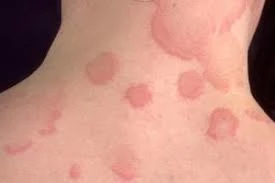Urticaria or Hives

An acute allergic reaction to either a ingested or inhaled antigen characterized by occurrence of transient, itchy, erythematous, raised patches of varying sizes and shapes. It’s a very common problem that can persist for long time, with proper treatment patients do well. Urticaria occurs because of release of some mediators like histamine and serotonin in the body from immune cells resulting in a state of dilatation of blood vessels and increased leakiness of vessels resulting in collection of fluid in the skin; as this fluid gets reabsorbed the lesions disappear. The trigger for release of these mediators can be allergic or even non-allergic.
Traditionally it was always considered that the main cause of urticaria was an immediate hypersensitivity reaction to an allergen that entered our body by way of ingested food or medications, inhaled pollen & dust etc or injected allergen like medications or insect bites. But now it is understood that very few of the urticaria are actually caused by a hypersensitivity reaction. In many of cases of urticaria the trigger cannot be identified. Sometimes urticaria can be associated with life threatening situation where because of laryngeal edema patients might suffer from choking sensation and if not treated urgently with appropriate medication it can result in death. So anytime there is a choking or breathing difficulty associated with urticaria it is very important to rush to a nearby hospital immediately. These situation are handled by injection of adrenaline.
FAQ's
Urticaria is an acute allergic reaction that can occur due to ingested or inhaled antigens. It is characterized by transient, itchy, erythematous (red), raised patches of varying sizes and shapes. It is a common problem that can persist for a long time, but with proper treatment, patients typically do well.
Urticaria occurs due to the release of mediators such as histamine and serotonin from immune cells in the body. This causes blood vessels to dilate and become more permeable, leading to fluid accumulation in the skin. As the fluid is reabsorbed, the lesions disappear. The triggers for this release can be allergic or non-allergic.
Yes, traditionally it was believed that urticaria was mainly caused by an immediate hypersensitivity reaction to allergens such as ingested food, medications, inhaled pollen, dust, or insect bites. However, it is now understood that only a small number of urticaria cases are actually due to hypersensitivity reactions. In many cases, the trigger remains unidentified.
Yes, in some cases, urticaria can be associated with life-threatening situations. For example, if there is laryngeal edema (swelling of the throat), it can cause a choking sensation and difficulty breathing. If not treated urgently with appropriate medication, it can result in death.
If there is choking or difficulty breathing associated with urticaria, it is critical to rush to a nearby hospital immediately. Such situations are typically treated with an injection of adrenaline.
